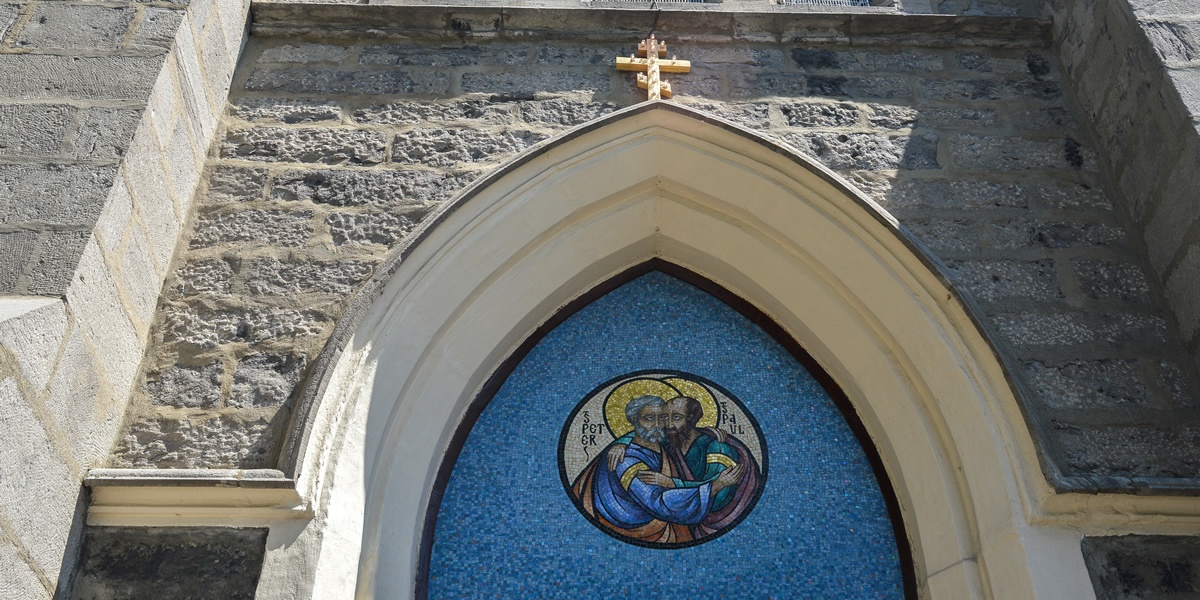Statement of the Commission on Faith and Witness on Religious Diversity
Christians respond to a world of religious diversity: An introduction
In our mobile, global world – and especially in a multicultural country like Canada – Christians find themselves living side-by-side with a multitude of religions. In many Canadian environments today, temples, synagogues, mosques, churches, and other places of worship are part of the urban landscape. Modern, religiously-tolerant democracy has intensified this ancient challenge: how are Christians to live, and how are they to relate to others, in a society with a diversity of religious beliefs and practices?
One of the challenges is rooted in a doctrine of salvation which lies at the heart of the belief of every Christian: Jesus Christ is the Saviour of all. The Gospel of John presents this fundamental truth in two ways. One is positive in tone, hopeful, and extends to all of creation: “For God so loved the world that he gave his only Son, that whoever believes in him should not perish but have eternal life. For God sent the Son into the world, not to condemn the world, but that the world might be saved through him” (John 3:16-17). It is the other, more challenging Scriptural pronouncement that creates an issue for Christians in a world of religious diversity: “Jesus said to him, ‘I am the way, and the truth, and the life; no one comes to the Father, but by me’” (John 14:6; see also John 3:5 and Acts 4:12). For Christians, this is a definitive statement – the gift of salvation is through Christ alone.
These verses raise two theological questions. One is the possibility of salvation for those who do not explicitly accept Christ. The other is: how ought we to relate, interact, share, even join together in common civil or ethical cause, with people of other religions? Any answer to these questions must begin with the Great Commandment – identified as summing up the entire law of God – which links love of God with unconditional love of neighbour (see Matthew 22:36-40, Mark 12:31, etc.). Love is a commitment to another’s good – without the expectation of personal benefit. And one’s neighbour includes all strangers.
Another relevant scriptural passage points to our apostolic obligation of public witness to Jesus Christ. The Great Commission, which ends the Gospel of Matthew, insists that we teach and make disciples of all nations (Matthew 28:19-20). Christians have followed this imperative throughout the history of Christianity. In modern democracies the Christian mandate to preach Jesus as sole Saviour must operate within a civil and legal framework of inherent rights, which emphasizes the equality of each person’s religious beliefs and the freedom of religious practice. Christians uphold the freedom of religion, not as if religious institutions were commodities to be picked and mixed, but out of respect for the dignity of the human person and the unique place of religion in human existence.
The deepest challenges involved in formulating a Christian approach to religious diversity are not rooted in the competition between religious and cultural values. Rather, the challenge comes from differences, among the Commission’s member churches, of understanding the Scriptural teaching about salvation. When the Commission members shared their churches’ views on religious diversity, these differences made our common reflection illuminating but also demanding.
Below, we will present these distinct theological approaches, and then conclude by reflection on possibilities of reconciliation despite the differences.
The challenge: the mandate to Christians of universal unconditional love
Jesus sums up the entirety of the Law in Matthew 22:36-40, Mark 12:30-31, and Luke 10:26-27 as loving God before all things and loving one’s neighbour as oneself: the Great Commandment (see also Galatians 5:14 and James 2:8). On this point, regardless of any doctrinal differences in other areas, the churches are unanimous. When a lawyer challenges Jesus to define who best exemplifies the idea of “neighbour”, the startling example Jesus uses is a Samaritan – a religious outsider thought of as an enemy and a heretic (see John 4:9) – as the model of unconditional love (Luke 10:36-37). It is on this consensus that our conclusion rests. Our thinking about the dilemma of diverse views must always be understood within this context: “Beloved, let us love one another; for love is of God, and he who loves is born of God and knows God. He who does not love does not know God; for God is love” (1 John 4:7-8).
The dilemma: who can be saved?
Even within the context of unconditional love, for Christians the mandate of John 14:6 remains foundational: Jesus is the Way and the Truth, so that no one comes to the Father except through Christ. Therefore, we still must ask how Christians are to understand the religions of non-Christians. On this point, the churches find themselves adopting different, and not easily compatible, approaches. Consensus about love for all leads to good ethical behaviour by Christians, and even to cooperative inter-faith actions in social care and justice, but it does not resolve the challenge raised by the fundamental doctrine of salvation. How does the salvation won by Christ in love extend to our neighbours who do not belong to the Christian faith?
These nuanced individual church positions are commonly grouped into three Christian approaches to the salvation of non-Christians.
The first view has been called “exclusivist”. It takes as its central tenet the 14th chapter of John’s gospel. While still holding firmly to the principles of respectful love and eschewing triumphalism, this theology maintains that explicit, overt commitment to Jesus as Saviour is required for salvation. Its adherents expect non-Christians who seek salvation to convert to Christianity – with oral acknowledgment of Jesus as Christ and Saviour (and often, baptism as well). In this first view, faith and the fundamental doctrines of faith are decisive for salvation, so love of neighbour is grounded in preaching and offering Jesus as the sole hope of the world: “Jesus answered them, ‘This is the work of God, that you believe in him whom he has sent’” (John 6:29; see also Colossians 1:28).
The second view might be called an “expansive-inclusive” understanding of Jesus Christ as Saviour. While still holding firmly to the tenet that salvation is only in and through Christ, it maintains that the outpouring of God’s saving grace and unconditional love, which Christians recognize in Jesus, is so absolute, complete and comprehensive that all humankind is susceptible of being embraced by it, whether Christ has been explicitly acknowledged or not. In this view of salvation, all have the opportunity to “come to Christ” or receive Christ’s saving gift of grace, whether they practice Christian faith or some other. In this view, Christ is the Saviour not only of his acknowledged followers and adherents, but also of those who do not know or name Him as Lord. He comes both to his own household and also to his neighbours (see Luke 15:6) and “desires all to be saved and to come to the knowledge of the truth” (1 Timothy 2:4). In this view, it is hope – from absolute trust in the mercy of God – which prevails, a hope which extends to all persons in the world.
The third view fully embraces the concept of “religious pluralism”. It maintains that Christians hold to the core principle of “Christ as Saviour” but acknowledges the validity of other religions as true paths to finding the perfect end towards which religion strives. In this view, then, Christianity is put on an equal theological plane with other religions’ claims to represent a definition of humankind’s relationship to God. Churches which hold this view eschew any notion of Christian exceptionalism, positing instead a notion of “many paths to God”. Here, the prevailing, decisive principles are love-beyond-doctrine and an unwillingness to place limitations on God’s power and freedom. This creates a position quite different from the first and second views.
Conclusion: living with the dilemma
(1) Is toleration – “live and let live” – the solution for Christian living?
As the above discussion shows, doctrinal debate about faith and salvation is still largely unresolved among the churches. So how should Christians answer the practical question: How am I to live and witness lovingly to my neighbour in a world so religiously diverse?
In civil democracies, the solution is often found in a rule of toleration. At its best, toleration is an excellent short-term solution, a true manifestation of love as respect for persons no matter what we think of their beliefs. Christians are told explicitly by Jesus that they should never judge, and never condemn (see Luke 6:37 and many other passages), and a toleration approach to neighbours is far superior to the old-time practice of name-calling or even wars based on religion. However, because Christians link salvation to the truth of Christ as Saviour (as in John 14:6), it is all too easy for us to distort good toleration into a hidden judgmentalism (“We have it right, but we won’t interfere with you in your error!”). To interact with the “other”, the long-term call is to authentic love, dialogue, and sharing the good news, carried on in an atmosphere of authentic respect: an acknowledgement of our existential situation of being Christian among our many neighbours.
(2) So what must we finally do?
In seeking an answer to such existential questions, we must remember that the three competing positions on religious diversity are all the outcome of our theological attempt to be faithful to Scripture, to our inherited traditions, and to the Mystery of God in Christ. Fundamentally, we need to keep in mind the distinction between theology and faith itself. Faith is “the assurance of things hoped for, the conviction of things not seen” (Hebrews 11:1). Theology happens when the heart and the mind strive to enter into dialogue with God: “faith seeking understanding” (Anselm of Canterbury, paraphrasing St. Augustine). Theology is vital and is a long and patient process that sharpens when we enter into a conversation with others across religious and theological boundaries.
Theology is never finished, never complete; it strives to enter into a mystery – salvation – which ultimately can only be found in God, which ultimately IS God. At the Commission on Faith and Witness, we came close to each other when we sat together in silence, finding – in the witness that we all trust God – our deep communion. Theology must continue – faith seeks understanding – but practicing “love your neighbour” can allow the Holy Spirit to teach us who that neighbour is.
Whatever our theology, the greatest command prevails: “Love God, Love your Neighbour.” We will continue the theological query together, recognizing our differences, working on resolving them, and trusting that God who is love will draw us closer together. But while we continue, our call as Christians is to “Love our Neighbour as ourselves,” without reservation. And in that “active silence” we will all be living in the mystery.








